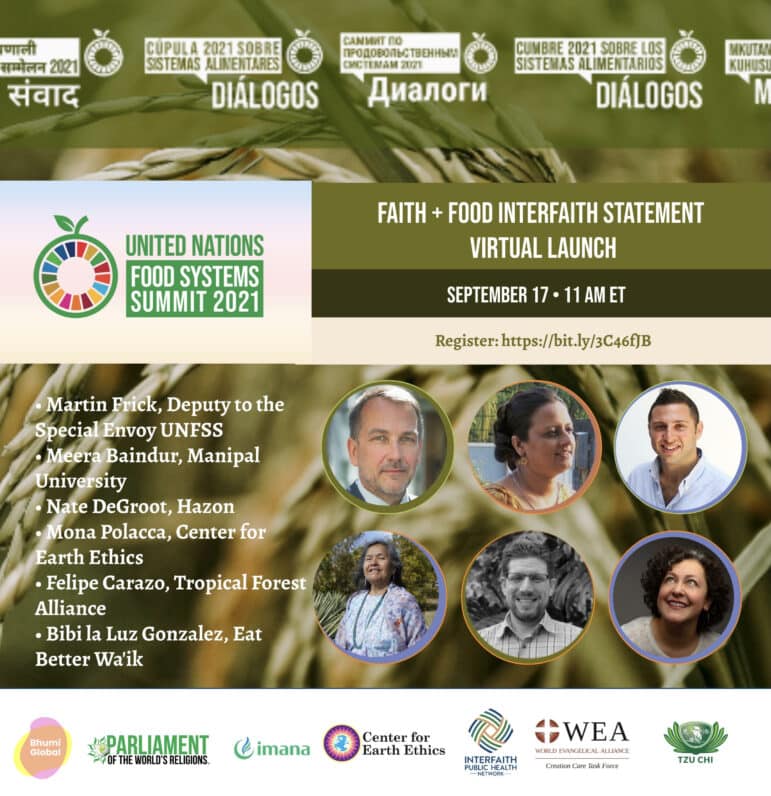
Faith + Food Coalition to Issue Interfaith Statement before UN Food Summit
“Food is both a building block of life and a basic human right.”
This fundamental truth underpins the “Interfaith Statement” for the United Nations Food Systems Summit, which will be presented at a virtual launch on Friday, September 17, at 11 a.m. EDT.
The Statement is the culmination the Coalition’s engagement in the formal process leading up to the United Nations Food Systems Summit on September 23 during the UN General Assembly in New York. Over the summer, the Faith + Food Coalition held five dialogues, and three follow up events, to articulate values-based perspectives to the Summit. The Statement is product of those efforts.
“The Interfaith Statement correctly moves values to the forefront in our global conversation about food,” says Karenna Gore, executive director of the Center for Earth Ethics. “The UN should heed this call and use the Food Systems Summit to advance the equitable and agroecological practices that are healthy for both people and planet.”
The Statement will be delivered to the Heads of the Food Systems Summit as well as key Member States. The UN already has indicated that it will include the Interfaith Statement in the Summit’s official record.
The launch event will bring together members of the faith community and civil society to present key findings from the Coalition’s dialogues, review the Statement’s Calls for Action, and outline next steps for faith-based organizations following the Summit. Scheduled speakers include:
- Martin Frick – Deputy to the Special Envoy for the UN Food Systems Summit 2021
- Karenna Gore – Founder and Executive Director, Center for Earth Ethics
- Bibi la Luz González – Founder, Eat Better Wa’ik
- Meera Baindur – Associate Professor of Philosophy, Manipal University Jaipur
- Felipe Carazo – Head of Public Sector Engagement at Tropical Forest Alliance, World Economic Forum
- Nate DeGroot – Associate Director and Spiritual & Program Director, Hazon Detroit
- Mona Polacca – Senior Fellow, Original Caretakers Program, Center for Earth Ethics
Andrew Schwartz, director of sustainability and global affairs at the Center for Earth Ethics, will moderate.
The launch event will be broadcast on Zoom, with simultaneous livestreams on Facebook and Twitter. Those wishing to participate via Zoom are encouraged to register in advance.
The Statement was months in the making. In preparing for the Summit, the UN encouraged civil society groups to hold dialogues to contribute outside perspectives. The Coalition, an alliance of seven organizations, formed to take part in that process. The Coalition aimed to bring voices from faith-based groups, Indigenous communities, small farmers and food producers, and underrepresented communities to the process.
In May and June, the Coalition hosted five dialogues corresponding to each of the five UN “Action Tracks” for the Food Systems Summit. The goal was to use the dialogues to examine global food systems critically, using the lens of faith and values.
Although billed by the UN as a “people’s summit,” the UN’s process raised concerns from the start. “The process surrounding the Summit has caused serious concern from observers and those of us who have participated in dialogues,” said Schwartz, who convened the Coalition. “While the Summit has welcomed unprecedented input from the civil society and key stakeholders, there is an obvious and concerning bias towards the corporation actors and methodologies that have led to the problems that the Summit is supposed to address.”
Over the summer, the Coalition’s efforts attracted the attention of Summit organizers and other multilateral organizations. The WHO invited the Coalition to present its findings at a webinar held on June 10. The UN invited the Coalition to present an online forum as an official “side event” to the Pre-Summit in Rome on July 27. And, in one of the last preliminary events before the Summit itself, on September 2 the Center for Earth Ethics and the UN co-hosted a “global dialogue” about faith-based perspectives on food systems.
The Statement was drafted by Schwartz along with Chris Elisara (World Evangelical Alliance), Gopal Patel (Bhumi Global), Joshua Basofin (Parliament of the World’s Religions), Kelly Moltzen (Interfaith Public Health Network), Marium Husain (Islamic Medical Association of North America) and Steve Chiu (Buddhist Tzu Chi Foundation). Dialogue participants Becky O’Brien, Daniel Perell, Grove Harris, Lina Mahy, Meera Baindur, and Nate DeGroot also contributed.
The Faith + Food Coalition (www.faithandfood.earth) is an alliance of seven organizations—Bhumi Global, Buddhist Tzu Chi Foundation, the Center for Earth Ethics, the Islamic Medical Association of North America, Interfaith Public Health Network, Parliament of the World’s Religions, and the World Evangelical Alliance—that bring voices from faith-based groups, Indigenous communities, small farmers and food producers, and underrepresented communities to the UN Food Systems Summit.
NB. This story has been updated to include comments from Karenna Gore and Andrew Schwartz.
